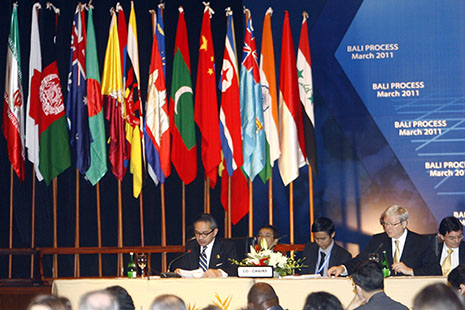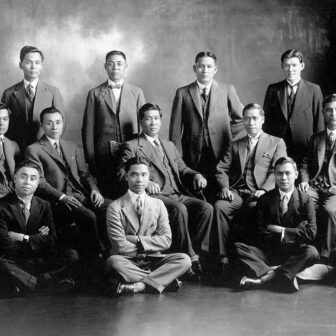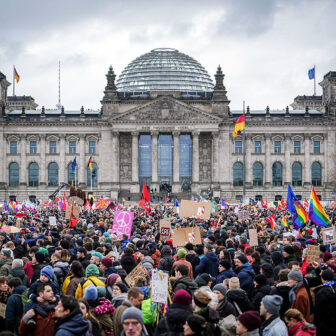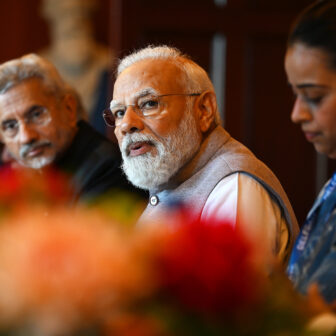When the Fourth Bali Regional Ministerial Conference on People Smuggling, Trafficking in Persons and Related Transnational Crime wound up on 30 March, the media focused on what the Australian government hadn't achieved at the meeting. It hadn't secured, or even attempted to secure, endorsement of a proposal to establish a regional assessment centre in East Timor. Of course, the Australian government has only itself to blame for the fact that it was being judged against a false expectation because it was responsible for creating that expectation in the first place.
Clearly, all the time and effort that Australia invested in negotiating with East Timor for the establishment of a regional assessment centre in that country since the prime minister’s ill-considered Lowy Institute speech last July has come to naught. This is no great blow to refugee protection in the region because, as I argued in an earlier article, the only problem that the centre could have solved was the political problem created for the government by the irregular maritime arrival of asylum seekers on our shores.
As it turns out, the East Timor failure was not a knock-out political blow to the Australian government either. All that the government needed to do in order to achieve its political objective was to find places outside Australia to which it could send people arriving here by sea. At the time of writing, it looked likely that Papua New Guinea, which is party to the Refugee Convention and Protocol, would agree to host a regional assessment centre, just as previously it agreed to participate in the Howard government’s Pacific Solution. In addition, Australia is about to enter into a legally non-binding Memorandum of Understanding, or MOU, with Malaysia under which it will be able to transfer to Malaysia 800 people who arrive here irregularly by sea after the agreement comes into effect. Malaysia has agreed that transferees will be “treated with dignity and respect and in accordance with human rights standards,” will be “provided with the opportunity to have their asylum claims considered,” and will not be returned to their country of origin if found to be refugees. In return, Australia has agreed to “fully fund the arrangement” and to “expand its humanitarian program and take on a greater burden-sharing responsibility for resettling refugees currently residing in Malaysia.” More specifically, Australia has agreed to add 4000 places over four years to its humanitarian program for the purpose of resettling those already in Malaysia, but has expressly stated that those places will “not be open to those who are transferred to Malaysia.”
For an obvious reason, the Australian government has refrained from claiming that a regional assessment centre is being established in Malaysia. When the opposition argued during the last election that Nauru should once again be used for asylum seeker processing, the government said that the fact that the island nation wasn’t a party to the Refugee Convention ruled it out. Malaysia is not a party to the Refugee Convention or Protocol, so any similar facility would invite charges of hypocrisy. What the Australian government is claiming is that the proposed MOU with Malaysia is an example “of steps we are taking to progress the wider Regional Cooperation Framework that was agreed to with our regional neighbours at the 4th Bali Process Regional Ministerial Conference.” In my view, however, the step being taken is a step backward not forward in relation to that framework.
Forty-three states and territories in the Asia–Pacific region are “Bali Process countries.” They include the source countries of the major forcibly displaced populations in the region as well as the major host countries. Moreover, eighteen countries from outside the region, including several potential resettlement countries, have been given a place at the table as “Other Participating Countries.” The International Organization for Migration, or IOM, and the Office of the United Nations High Commissioner for Refugees, or UNHCR, which are members of the “Bali Process Steering Group” along with Australia, Indonesia, New Zealand and Thailand, are key players in the Bali Process. Eleven other intergovernmental organisations and processes with relevant mandates are described as “Other Bali Process Organisations” and are also able to participate if they so desire.
Since the inauguration of the Bali Process at a ministerial conference co-chaired by Australia and Indonesia in February 2002, three further ministerial conferences have been held, in April 2003, April 2009 and March 2011. An ongoing program of activities has involved, among others, justice, immigration, foreign affairs and police agencies in the Asia–Pacific region. The many practical outcomes have included changes in country-level legislation, policy and/or practice in relation to issues such as human trafficking and people smuggling.
Up until 2009, the Bali Process focused on transnational crime. But the combination of persistent effort by UNHCR, a shift in attitude following the change of government in Australia, and a mini-refugee crisis in South East Asia (which persuaded some key regional countries that refugee protection had to be part of a regional response to irregular movement) led to the inclusion of refugee protection on the agenda of the April 2009 ministerial meeting, and it has stayed on the Bali Process agenda since then.
At the April 2009 meeting an ad hoc working group process was established to develop regional responses to “current situations concerning the irregular movement of people in the Asia-Pacific region.” In July 2009, senior officials from Afghanistan, Australia, Bangladesh, Burma, India, Indonesia, Malaysia, the Maldives, New Zealand, Pakistan, Sri Lanka, Thailand, the UNHCR, the IOM and the UN Office on Drugs and Crime met to consider responses to the irregular movement of Afghans, Sri Lankans and Rohingya. Another Ad Hoc Group meeting was held in June 2010 to review progress and to agree on further cooperative strategies for dealing with irregular movement of Afghans, Sri Lankans and Rohingya in particular. At that meeting, senior officials agreed to a proposal for the UNHCR to host a workshop on regional cooperation on refugees and irregular movements.
The Ad Hoc Group workshop on regional cooperation on refugees and irregular movements was held in Manila in late November 2010. At that workshop, the UNHCR put forward a proposal for what it called a Regional Cooperation Framework. Its proposal was that states should develop a non-binding set of “common understandings” for dealing with irregular movement and asylum seekers in a “protection sensitive” manner. These common understandings could then form the basis for interested states to establish “practical cooperative arrangements to address specific situations” and “regional support functions” in three key areas: processing and case management, resettlement and burden sharing, and repatriation of persons not in need of international protection. The regional support functions were proposed as a means of promoting protection-sensitive regional harmonisation of national standards for dealing with irregular movement and asylum seekers as well as more efficient use of resources through pooling arrangements.
On 9 March 2011, Ad Hoc Group senior officials met again and agreed to recommend that the Bali Process adopt a non-binding regional cooperation framework underpinned by five core principles which could be implemented by practical arrangements entered into by interested states. The five core principles were the following:
• Irregular movement facilitated by people smuggling syndicates should be eliminated and States should promote and support opportunities for orderly migration.• Where appropriate and possible, asylum seekers should have access to consistent assessment processes, whether through a set of harmonised arrangements or through the possible establishment of regional assessment arrangements which might include a centre or centres, taking into account any existing sub-regional arrangements.
• Persons found to be refugees under those assessment processes should be provided with a durable solution, including voluntary repatriation, resettlement within and outside the region and, where appropriate, possible “in country” solutions.
• Persons found not to be in need of protection should be returned, preferably on a voluntary basis, to their countries of origin, in safety and dignity. Returns should be sustainable and States should look to maximise opportunities for greater cooperation.
• People smuggling enterprises should be targeted through border security arrangements, law enforcement activities and disincentives for human trafficking and smuggling.
In addition to the core principles, meeting participants suggested that the following “considerations” should guide states in developing and implementing practical arrangements:
i. Arrangements should promote human life and dignity.ii. Arrangements should seek to build capacity in the region to process mixed flows and where appropriate utilise available resources, such as those provided by international organisations.
iii. Arrangements should reflect the principles of burden-sharing and collective responsibility, while respecting sovereignty and the national security of concerned States.
iv. Arrangements should seek to address root causes of irregular movement and promote population stabilisation wherever possible.
v. Arrangements should promote orderly, legal migration and provide appropriate opportunities for regular migration.
vi. Any arrangements should avoid creating pull factors to, or within, the region.
vii. Arrangements should seek to undermine the people smuggling model and create disincentives for irregular movement and may include, in appropriate circumstances, transfer and readmission.
viii. Arrangements should support and promote increased information exchange, while respecting confidentiality and upholding the privacy of affected persons.
The regional cooperation framework proposal drew heavily on the paper presented by the UNHCR at the Manila workshop but was very evidently influenced by the Australian government’s political agenda as well. For example, the reference to “the possible establishment of regional assessment arrangements which might include a centre or centres” was quite obviously Australian language intended to enable establishment of the regional assessment centre it was already pursuing. By contrast, the UNHCR’s paper explicitly stated that the regional support functions that it was proposing could be “virtual entit[ies].”
On 10 March 2011, senior officials of the Bali Process held a meeting at which participants endorsed the Ad Hoc Group Co-Chairs’ Statement and “commended the document to Bali Process Ministers for consideration.” At this point all the real work had been done. Paragraphs 16 to 19 of the Final Co-Chairs’ Statement of the Fourth Bali Regional Ministerial Conference set out agreement on a regional cooperation framework which is identical to that recommended for adoption by the senior officials. Moreover, in paragraph 23, “Ministers tasked officials from Ad Hoc Group countries and other interested countries to operationalise the regional cooperation framework in conjunction with UNHCR and IOM as appropriate through bilateral and multilateral arrangements.” Paragraph 23 also states that ministers regarded the paper presented by the UNHCR at the Manila workshop as being “a useful foundation for operationalising the framework, particularly the three regional support functions.” It really is an extraordinary distance for our region to have travelled in only two years.
MOST countries in the Asia–Pacific region are not parties to the Refugee Convention or Protocol and have made little or no attempt to provide for the protection of refugees in domestic law. Against this background, the mere willingness to talk about refugee protection cooperation at a regional level was a huge step forward. Consider how legally and culturally diverse the countries in this region are and how great their obsession with defending national sovereignty and it becomes apparent how truly impressive an accomplishment it was on the part of the UNHCR and the Australian government to have got them to take even this baby step beyond merely talking. I use the term “baby” advisedly. As with the first step a baby takes, this is very significant as a starting point, but there will be cause for profound disappointment if it turns out to be an end point as well. Moreover, it can’t be taken for granted that any steps that follow won’t be missteps. At the risk of pushing the analogy too far, it is worth keeping in mind that it also can’t be assumed that a baby will turn into an adult who walks a constructive rather than destructive path. The potential for goodness exists but will only be realised if proper guidance is provided.
In her Lowy Institute speech in July last year Prime Minister Gillard promised to pursue not only a regional assessment centre but also a “sustainable, effective regional protection framework.” An effective regional protection framework would be one which ensures that all asylum seekers in the region have access to fair procedures for determining their protection claims, obtain a durable solution within a reasonable timeframe if found to be in need of international protection, and receive treatment that complies with human rights standards in the meantime. The Fourth Bali Regional Ministerial Conference outcome was a necessary and important first step towards achieving such a protection framework but of itself does not constitute such a framework. The proof of the pudding will be in how it is brought into operation.
It needs to be acknowledged that creating a “sustainable, effective regional protection framework” is necessarily a long-term project that will only come to complete fruition decades hence, if at all. For example, most countries in the Asia–Pacific region have long refused to contemplate the local integration of refugees as a general rule, though some are, or have been, willing to do so in relation to specific caseloads or individuals. As for resettlement, there are so few places on offer that only 10 per cent of the refugees who have been assessed by the UNHCR as needing resettlement globally can be resettled each year. It is a lot easier to imagine achieving the goal of giving all refugees in our region access to a durable solution in a timely fashion if local integration in countries that presently regard themselves as mere transit countries is an option alongside resettlement. It is therefore very positive indeed that Bali Process countries were prepared to accept as a core principle of the regional cooperation framework that persons found to be refugees “should be provided with a durable solution, including… where appropriate, possible ‘in country’ solutions” because “in country solution” is a UNHCR-coined euphemism for local integration. It will be a herculean undertaking to build a bridge between principle and practice, however.
There is little reason to expect or even hope that other Bali Process countries will engage in building the bridge between principle and practice in relation to local integration or anything else unless Australia, the country with the least excuse for failing to do so, walks the protection talk contained in the Final Co-Chairs’ Statement of 30 March 2011. My reason for stating that Australia’s proposed agreement with Malaysia will constitute a step backward rather than forward in the bringing into operation of the Bali Process Regional Cooperation Framework is that it involves Australia’s disregarding the protection-related principles and considerations set out in the Final Co-Chairs’ Statement.
It cannot be sufficiently emphasised that Australia’s own Refugee Convention obligation to ensure that a person who is, in fact, a refugee (whether or not formally recognised as such) is not returned directly or indirectly to a place of danger – its non-refoulement obligation – is engaged the moment such a person comes within Australia’s territorial or other jurisdiction. Australia’s decision to transfer 800 irregular maritime arrivals to Malaysia is in effect, therefore, a decision to take the risk of breaching its non- refoulement obligation as a result of future actions of the Malaysian government.
Malaysia’s domestic legal system has no mechanism for determining asylum claims and no safeguards against refoulement. All that Malaysia has been prepared to do is to allow the UNHCR to engage in mandate activities within its territory. Pursuant to its mandate, the UNHCR registers asylum seekers who approach its office in Kuala Lumpur, conducts refugee status determinations, seeks resettlement places for those found to be refugees, and provides some material assistance to refugees. At the end of February 2011, the UNHCR in Malaysia was trying to deal with approximately 92,700 registered refugees and asylum seekers with far from adequate resources.
What Malaysia is promising is that it will allow transferees under the proposed MOU with Australia to approach the UNHCR for a refugee status determination. The problem is that UNHCR status determination falls short of minimum standards of procedural fairness, creating an unacceptably high risk that determinations will result in incorrect negative decisions. If incorrectly rejected asylum seekers among the transferees are deported by Malaysia, Australia will be placed in breach of its non-refoulement obligation. It is worth noting, too, that previous promises by the Malaysian government to refrain from deporting holders of UNHCR registration cards have been breached in practice. Therefore, if the Malaysian government chooses to behave similarly in relation to its undertaking not to refoule transferees under the MOU, Australia could hardly claim that such conduct was unforeseeable. In a context where actions speak louder than words, the Australian government is effectively saying to the rest of the region that there nevertheless exist “appropriate circumstances” for the transfer of asylum seekers from Australia to Malaysia within the meaning of the core principles articulated in the Final Co-Chairs’ Statement.
It is also problematic that Australia is implicitly representing that its arrangement with Malaysia is one that is guided by the consideration that “arrangements should promote human life and dignity.” Malaysia’s treatment of asylum seekers and refugees generally, while improving, still falls far short of international human rights standards. Although the Australian government has obtained an undertaking from the Malaysian government to treat transferees “with dignity and respect and in accordance with human rights standards,” it seems reckless to place reliance on it in light of Malaysia’s well-documented past practice. Moreover, Australia itself has no effective ability to protect the civil and political rights of the people it transfers to Malaysia. Australian funding of material assistance to the transferees could ensure protection of their economic and social rights but the immigration minister, Chris Bowen, has explicitly stated that the transferees “should not get special treatment in terms of access to any particular welfare or work rights, etcetera.”
Finally, Australia’s agreement to add 4000 places over four years to its humanitarian program for the purpose of resettling refugees already in Malaysia is a very positive burden sharing measure. But by taking such extraordinary measures to avoid local integration of irregular maritime arrivals, Australia is making it much more difficult for the UNHCR or anyone else to convince other regional countries that they should be readier than they presently are to contemplate local integration as a durable solution.
Possibly a “sustainable, effective regional protection framework” can still be achieved in the long term, but baby’s road to decent adulthood has just become a whole lot rockier. •




